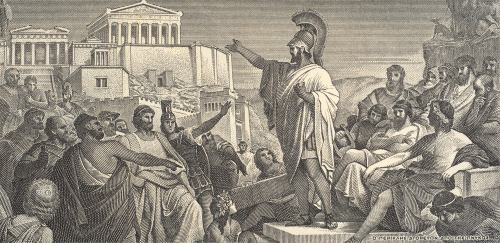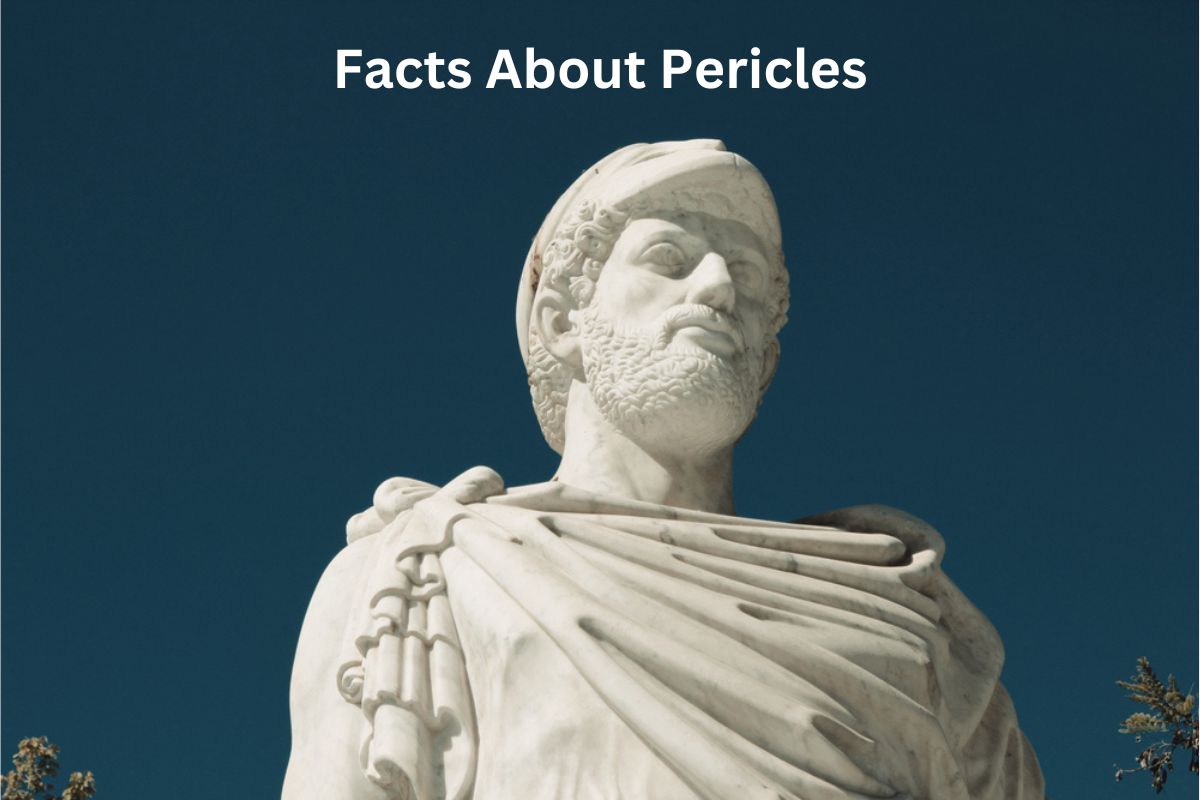Pericles, a prominent figure in ancient Greece, was a statesman, military leader, and orator who played a pivotal role in shaping the Golden Age of Athens.
Born around 495 BC into the esteemed Alcmaeonid family, he rose to power and dominated Athenian politics from 461 BC until his death in 429 BC.
Pericles is celebrated for his significant contributions to Athenian democracy, his patronage of arts and philosophy, and his strategic leadership during the early stages of the Peloponnesian War.
Despite his controversial relationship with Aspasia, a foreign-born woman, Pericles left a lasting legacy, transforming Athens into a cultural and intellectual powerhouse and solidifying his place in history as a visionary leader.
Pericles Facts
1. Born around 495 BC in Athens
Pericles was born into the prominent Alcmaeonid family, which was known for its influence and wealth in ancient Athens.
His father, Xanthippus, was a respected statesman and military commander, and his mother, Agariste, was a member of the powerful and noble Cimon family.
Also Read: Pericles Accomplishments
Pericles received an excellent education, studying under philosophers such as Damon and Zeno of Elea, which played a significant role in shaping his intellect and character.

2. Dominated Athenian politics from 461 BC until his death in 429 BC
Pericles emerged as a prominent figure in Athenian politics in the mid-5th century BC. He was elected strategos (general) numerous times and became the leading statesman in Athens.
His charismatic leadership, oratory skills, and reputation as an honest and capable administrator earned him the trust and support of the Athenian populace. He was re-elected strategos annually, effectively leading Athens for over three decades until his death.
3. Strengthened Athenian democracy and expanded participation in government
During his time in power, Pericles introduced several democratic reforms that solidified and expanded the democratic system in Athens. He increased the number of public offices that were compensated, allowing citizens of modest means to participate in the government.
This not only encouraged greater involvement of the lower classes but also reduced the potential for corruption by making it more difficult for wealthier citizens to dominate politics solely through their financial means.
Pericles also initiated the practice of paying citizens for jury service, enabling even the poorest Athenians to take part in the judicial system. This move was significant in ensuring that all citizens, regardless of economic status, had a role in the administration of justice and the legal process.
Moreover, Pericles’ policies aimed to promote the importance of civic duty and instill a sense of pride and responsibility in Athenian citizens.
His emphasis on the concept of “politeia,” or active citizenship, encouraged Athenians to engage actively in public affairs, contributing to the development of a participatory democracy where citizens had a say in decision-making processes.
These reforms strengthened the Athenian democracy and solidified Pericles’ reputation as a champion of the people and a visionary leader.
4. Supported construction of the Parthenon and other building projects in Athens
One of Pericles’ most significant contributions to Athens was his support for ambitious building projects that aimed to beautify and glorify the city. The most famous of these projects was the construction of the Parthenon, a magnificent temple dedicated to the goddess Athena, the patron deity of Athens.
The Parthenon was designed by the architects Ictinus and Callicrates and adorned with intricate sculptures created by the renowned sculptor Phidias. It stood as a symbol of Athenian power, wealth, and cultural achievement, and it remains an iconic example of Classical Greek architecture to this day.
In addition to the Parthenon, Pericles oversaw the construction of other important structures on the Acropolis, including the Propylaea (the monumental entrance gateway) and the Erechtheion (a temple dedicated to multiple gods, including Poseidon and Erechtheus).
These grand projects transformed the Acropolis into an awe-inspiring architectural complex that showcased the glory of Athens and its dedication to the gods.
5. Led Athens during the early stages of the Peloponnesian War
The Peloponnesian War was a protracted conflict between Athens and its allies, known as the Delian League, and Sparta and its allies, known as the Peloponnesian League. The war erupted in 431 BC and lasted for nearly three decades.
Pericles led Athens during the early stages of the war, and his strategic decisions shaped the Athenian approach to the conflict.
Pericles’ strategy focused on avoiding direct land battles with the superior Spartan infantry and instead relied on the strength of Athens’ navy.
He believed that Athens’ powerful navy, along with its robust defensive walls and access to maritime trade, would enable the city to withstand Spartan sieges and maintain its strength. This strategy, known as the “Periclean Strategy,” aimed to wear down Sparta over time and demonstrate Athenian resilience.
Unfortunately, while the Periclean Strategy protected Athens from immediate military defeat, it did not prevent the devastating impact of the plague that struck Athens in 430 BC.
The overcrowded living conditions within the city’s walls during the war facilitated the rapid spread of the disease, leading to a significant loss of life, including the death of Pericles himself in 429 BC.

6. Famous for the Funeral Oration speech honoring fallen Athenian soldiers
Pericles’ most famous speech is the Funeral Oration, which he delivered during the first year of the Peloponnesian War. This oration was part of a customary funeral ritual held annually to honor Athenian soldiers who died in battle.
In his speech, Pericles praised the virtues of Athenian democracy, extolled the bravery of the fallen soldiers, and emphasized the importance of individual freedom and the rule of law. He argued that Athens was a model for other city-states and that its citizens’ sacrifices were essential for preserving and advancing democracy.
The Funeral Oration, as recorded by the historian Thucydides, has become a symbol of Athenian democracy and its values. It highlights the Athenian belief in civic duty, the pursuit of excellence, and the idea that the collective efforts of its citizens made Athens a city worthy of admiration and emulation.
The speech also serves as a reflection of Pericles’ skill as an orator and his ability to inspire and unite the Athenian populace during a challenging and uncertain time in their history.
7. Patron of arts, philosophy, and literature in ancient Athens
Pericles was a strong advocate of intellectual pursuits and recognized the importance of promoting arts, philosophy, and literature in Athens. During his leadership, he actively supported and sponsored various artists, philosophers, and writers, contributing to the flourishing of culture and intellectual life in the city.
Pericles’ patronage included prominent intellectuals like the philosopher Anaxagoras, whose presence in Athens greatly influenced the development of philosophical thought.
Anaxagoras was one of the first philosophers to propose a scientific explanation for natural phenomena, challenging traditional beliefs about the gods’ direct involvement in the workings of the world.
Moreover, Pericles was an avid supporter of dramatic arts. He encouraged the playwrights of his time, such as Sophocles and Euripides, to create new tragedies, which became central to the cultural and social life of ancient Athens. These plays explored deep moral and philosophical questions, provoking thought and reflection among the audience.
8. Introduced a citizenship law to safeguard Athenian citizenship
Pericles passed a law known as the Periclean Citizenship Law, which aimed to protect the purity of Athenian citizenship. The law stipulated that only individuals with both parents being Athenian citizens could themselves become citizens of Athens.
This measure was an attempt to prevent foreigners or individuals with potential loyalties to other city-states from acquiring Athenian citizenship.
The Periclean Citizenship Law reflected Pericles’ concern about maintaining the unique identity and stability of Athens amidst its growing influence and interactions with other city-states and cultures.
By upholding strict citizenship criteria, Pericles sought to safeguard Athenian society from potential internal conflicts and maintain a cohesive civic body committed to the welfare of the city.
9. Had a controversial relationship with Aspasia, a foreign-born woman
Pericles’ personal life was not without controversy. He formed a romantic relationship with Aspasia, a woman who was not an Athenian citizen. Aspasia was originally from Miletus, a city on the coast of Asia Minor (present-day Turkey), and she was renowned for her beauty, intelligence, and wit.
Aspasia was not just a lover but also a significant intellectual figure in Athens. She ran a prominent intellectual and social salon, where influential thinkers, philosophers, and politicians gathered to engage in discussions and debates.
Aspasia’s intelligence and eloquence earned her considerable influence, and some historians suggest that she may have influenced Pericles’ decisions and policies to some extent.
However, their relationship was met with criticism and scandal in Athenian society. Athenian law barred foreign-born women from marrying citizens, and Pericles’ liaison with Aspasia caused political opponents to attack his reputation and question his commitment to Athenian values.
Despite the criticism, Pericles maintained his relationship with Aspasia, and she continued to play a significant role in Athens’ cultural and intellectual life.
10. Died during the Plague of Athens in 429 BC
Tragically, Pericles’ leadership was cut short by the outbreak of the Plague of Athens. In 430 BC, a deadly epidemic swept through Athens, causing widespread suffering and claiming the lives of many Athenians, including Pericles’ two legitimate sons.
The crowded living conditions within the city’s walls during the Peloponnesian War facilitated the rapid spread of the disease.
Pericles, too, fell victim to the plague and passed away in 429 BC. His death marked the end of an era in Athenian politics and leadership. While his successors continued the war effort, Athens faced significant challenges in the years to come, and the loss of Pericles was deeply felt by the Athenian populace. Nevertheless, his legacy lived on, and his contributions to democracy, arts, and culture left an indelible mark on the history of Athens and Western civilization.
